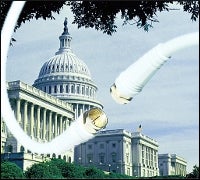 |
The 111th Congress convenes today, and its first order of business is clear: sending an economic stimulus bill to President-elect Obama’s desk within two weeks of his inauguration.
The stimulus package is certain to be a whale of a bill, with hundreds of billions of dollars to be allocated to sectors of the economy in the hopes of creating new jobs and nursing the market back to health.
Observers expect provisions to spur broadband adoption to be included in the stimulus package, as well.
Speaking yesterday at a seminar on reforming the Federal Communications Commission, Jessica Rosenworcel, a senior attorney for the Senate Commerce Committee, said that as lawmakers begin to craft the stimulus package, proposals are already circulating for steps the government could take to ensure that more Americans have high-speed Internet service.
Part of the impetus for increasing broadband deployment is the growing sense that the United States is falling behind. A prominent report in fall found that the nation had slipped to 15th place in per capita broadband adoption, down from fourth place in 2001.
Critics have quibbled with the report’s methodology, but Obama has already signaled his intention to increase broadband deployment with the twin goals of bridging the digital divide and stimulating job growth with a more tech-savvy labor pool.
Broadband advocates have been lining up their own policy recommendations, while lobbyists from the cable and telecom industries have been meeting with Congressional offices to secure language favorable to their clients.
Supporters claim that a broadband stimulus measure would drive network expansion that creates tens of thousands of “shovel-ready” jobs, while at the same time, laying the groundwork for a flood of innovation that would revitalize other sectors of the economy down the road.
“Spurring investments in broadband and other network infrastructures (like health IT and green grid) can create a significant number of new good jobs,” Robert Atkinson, president of the Information Technology and Innovation Alliance, wrote in a recent article for the Huffington Post. “And if the package is designed in the right way, a large share of these jobs can be created in 2009, bringing much needed short-term economic stimulus.”
“Unlike stimulus measures that support consumer spending, these investments will spur productivity growth and other societal benefits, including improved education, better health care and reduced greenhouse gases,” he added.
How it might happen
One of the commonly heard proposals involves tax credits for providers who deliver broadband service to rural areas where it is currently unavailable. ISPs have been reluctant to build out there networks in sparsely populated areas because the return on investment — measured by the number of new subscribers they stand to gain from the build-out — might not recoup the infrastructure expense.
In areas with extremely low populations or where the terrain is particularly inhospitable to network expansion, some plans call for the government to subsidize a greater portion of the build-out. There is also talk of government grants and bonds to help finance universal service.
Some proposals also call for tax credits to providers for enhancing speeds in areas where only baseline broadband service is available.
“If Congress is serious about using the stimulus package to really drive broadband deployment in 2009, it needs to ensure that a sizeable portion of any stimulus package is focused on tax credits to companies to deploy broadband to areas without it and to expand speeds in areas with it,” Atkinson said.
Atkinson, whose group is planning to release a detailed broadband policy recommendation tomorrow, takes issue with the agenda of another prominent tech-policy player in Washington. Free Press, the media-reform advocacy group, has issued its own broadband agenda, calling for the government to spend $44 billion over the next three years to spur providers to bring fiber connections to the home.
To Atkinson, Free Press’ plan doesn’t do enough to create jobs in 2009, instead giving too much emphasis on the group’s hot-button issues of open networks and provider competition.
Free Press’ broadband plan leans heavily on the Universal Service Fund, a subsidy to provide phone service to low-income and rural Americans administered by the FCC.
The two groups agree that any broadband provisions in a stimulus package must address the issue from the demand side — that is, in areas where broadband service is available, how can the government encourage more people to sign up for it?
Some proposals call for government vouchers for computers and broadband service. There is also discussion of reforms to the FCC’s e-Rate program, a provision of the 1996 Telecommunications Act that requires ISPs to provide libraries and schools with Internet service at an affordable rate.
A subtext of the debate over the proper role of broadband within the economic stimulus package could turn on a matter of definition. According to a recent Wall Street Journal report, big cable companies are lobbying lawmakers to define broadband speeds as 5 Mbps, a sharp increase from the FCC’s current minimum standard of 768 Kbps.
Providers would have to offer service meeting the minimum speed in order to qualify for the tax credits under the proposed plans, which could freeze out smaller phone companies with digital subscriber-line services that are slower than cable modems.
The cable industry is also looking to reach into areas considered underserved with next-generation networks. To qualify for the tax break, a next-generation network would have to deliver speeds around 40 Mbps to 50 Mbps, according to the Journal.


